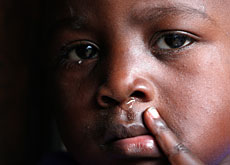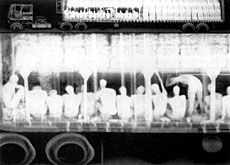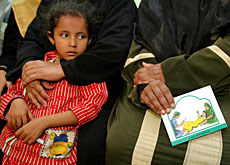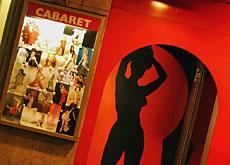Unicef sounds alarm over child trafficking

The Swiss section of the United Nations children's organisation Unicef has called on Switzerland to step up its fight against child trafficking.
It wants the government to draw up a national action plan on children’s rights to deal with the trade in minors. The lack of data on such cases also needs to be amended, says Unicef.
Presenting its “Switzerland and Child Trafficking” study, which was released on Thursday, Unicef said that Switzerland, like many other western European countries, was both a transit and destination country for child trafficking.
But the true scale of the problem was hard to define due to lack of statistical information.
“There is research done by the government and this stated that on a yearly basis 3,000 people are trafficked into Switzerland and this includes children,” Elsbeth Müller, director of Unicef Switzerland, told swissinfo.
“They don’t differentiate between children and adults, but from what we know and our experience it is clear that children are part of this.”
Cases have been recorded involving minors from countries such as Albania, Cameroon and Brazil. Trafficked children usually end up working in the sex or drugs trade, said Müller.
Unicef has also pointed to cases of girls and boys being passed off – falsely – as children of asylum seekers.
Space to do more
Although legal instruments – both national and international – do exist to protect children from trafficking in Switzerland, Unicef says there is “space to do more”.
It wants a national plan for children’s rights, which would set out concrete measures against trafficking. This would follow long-standing recommendations by the UN.
“One of the most important issues will be that children who are at risk of being trafficked and children who are trafficked will not be victimised and criminalised [under the Swiss system],” said Müller.
“For Unicef it is important that these children get all the relevant support such as counselling but also the residency permit for Switzerland,” she added.
Granting residency would stop adults putting pressure on children and encourage young people to go to the police, says Unicef.
International adoption
International adoption is another aspect of child trafficking which affects Switzerland. “It can be linked with trafficking as soon as children are sold in a way that a substantial amount of money is involved,” explained Müller.
In Switzerland up to 600 children are adopted from abroad each year, with an estimated 30 and 90 per cent carried out outside official channels. Unicef believes there are some cases of illegal adoption.
The Swiss study into trafficking was part of a wider Unicef report on the issue in Europe. This found that no country was immune from the illicit trade and called on governments not to forget the rights of the child in their anti-trafficking measures.
On a global level, it has been estimated that each year 1.2 million children are victims of trafficking, with the trade having a reported turnover of around SFr8.4 billion ($7.2 billion).
Müller says prevention and raising awareness are key elements for stopping the trade. “And this means we all have to fight it, because every single child who is trafficked is one case too many,” she said.
swissinfo, Isobel Leybold-Johnson
October 18, 2007 was also the European Union’s first Anti-Trafficking Day. The report was released to coincide with this.
Switzerland has signed up to key instruments against child trafficking, such as the UN Convention on the Rights of the Child and Hague Convention on Intercountry Adoption.
The Swiss Coordination Unit against the Trafficking of Persons and Smugggling of Migrants oversees the fight against trafficking in Switzerland.
The UN Palermo Protocol describes the trafficking in persons as the recruitment, transportation, transfer, harbouring or receipt of persons, by fraudulent means, for the purpose of exploitation.
This is defined as prostitution of others or other forms of sexual exploitation, forced labour or services, slavery or practices similar to slavery, servitude or the removal of organs.
The Protocol defines trafficking in children as the recruitment, transportation, transfer, harbouring or receipt of a child for the purpose of exploitation, even if this does not involve any fraudulent means such as violence, deception or coercion. A child is defined as any person under 18 years of age.

In compliance with the JTI standards
More: SWI swissinfo.ch certified by the Journalism Trust Initiative




You can find an overview of ongoing debates with our journalists here . Please join us!
If you want to start a conversation about a topic raised in this article or want to report factual errors, email us at english@swissinfo.ch.